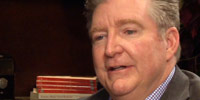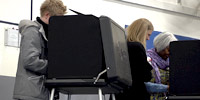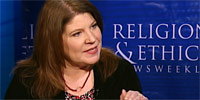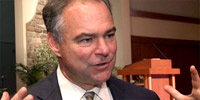In This Episode << SLIDE LEFT TO SEE ADDITIONAL SEGMENTS
Election Analysis: The Religious Vote
LUCKY SEVERSON (guest anchor): Kim Lawton has been covering the impact of religion and religious voters in this election. She spoke with Andrew Kohut, director of the Pew Research Center for the People & the Press, about what the exit polling showed.
KIM LAWTON: It’s been a pretty interesting election. How did religion play into all of this?
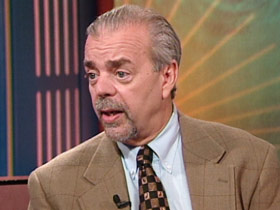
ANDREW KOHUT: (Pew Research Center for the People & the Press) Well, the religious voting patterns were clear in this election. Absent a compelling case between Gore and Bush from a voter point-of-view, or absent big issues or proposals from the candidates. What the pattern of the vote really reflected are the ideological and partisan fault lines in the electorate, among them religion. So, the most religious voters in this sample interviewed in the exit poll on Tuesday night found religious people voting at a rate of 62 percent for George W. Bush. The least religious people, people who never attend church or religious services voted only 31 percent for Bush.
LAWTON: How did you measure the religiosity of the voters?
KOHUT: Well, in terms of frequency of religious attendance and also in terms of the denominations — the specific denominations of the people that were interviewed by the exit polls.
LAWTON: Prior to this election, we heard a lot about the Catholic vote and that Catholic voters could be one of the most important swing votes. Were they?
KOHUT: They were indeed. The Catholic vote divided just about evenly between Gore and Bush, tipping a little bit toward Al Gore. But going a little bit less Democratic than they did four years ago, as the Catholic vote slowly becomes a little less Democratic and a little more Republican seemingly with each election.
LAWTON: And that is a trend we’ve been seeing, isn’t it? At one time, Catholics were considered sort of the stronghold of the Democratic Party — that’s shifting now?
KOHUT: Well, it certainly was and it is shifting. They were part of the old New Deal coalition reflecting the ethnicity of many American Catholics in the ’30s and ’40s. But as these groups of voters became more assimilated, they have become more mainstream and therefore divide more evenly between the Republican and Democratic parties.
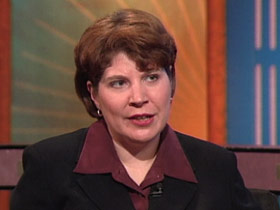
LAWTON: And in an election as close as this one, does that make a big difference in certain areas?
KOHUT: Well it sure does because in a close election, all swing groups — among them Catholics and other groups who have a close partisan division — make a big difference in the vote.
LAWTON: What about the religious right? They were a little less visible this time around. Did they play a role in this?
KOHUT: Well, this was an election where both candidates tried not to be too ideological, and therefore, we didn’t hear George Bush talking about a lot of things that would turn on the religious conservatives, yet they really voted for him at a high level, something like 79% of the self-described religious conservatives said they voted for George W. Bush. Absent that vote, Al Gore wins the election by — with a 52% majority.
LAWTON: So, have they become indeed a permanent part of the Republican Party base?
KOHUT: I think there’s little question that Christian conservatives — white Christian conservatives — are a permanent part of the Republican base just like African-American evangelicals are an awfully important part of the Democratic base.
LAWTON: And I was going to ask you about that. To what extent did black churchgoers go for Gore?
KOHUT: Over 9 in 10 backed the Democratic candidate which is as high a level as was the case for Clinton in 1996.
LAWTON: And that reflected the African-American community generally?
KOHUT: I think it reflected the African-American community generally and studies that will be ongoing will try to assess how good a job the African-American churches did in turning out the vote for Al Gore and how crucial they were to his victory or near-miss.
LAWTON: OK, thank you.
KOHUT: You’re welcome.

